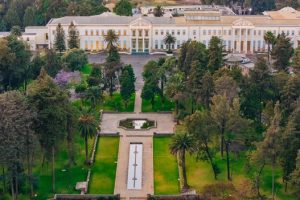
The biggest and most important item on the reformist agenda of the transitional government in Ethiopia over the last nearly two years was the achievement of peace. For the last many decades, Ethiopia had been rocked by wars, ethnic conflicts, and political disputes. These conflicts were mainly triggered by the various elite groups that claimed to speak in the name of the people or the constituencies they presumably claim to represent.
The Ethiopian people never started ethnic conflicts. Only the political elites or the ruling classes were behind so many upheavals and disasters. That was why it was always easier to start a war in Ethiopia than finish it. Elite groups mobilize the masses around political agendas that are often different or opposed the aspirations of the people. That was also why it was difficult or impossible to achieve lasting peace in a country that has been at war with itself for much of the last half century.
Has the transitional government achieved one of its central objectives the reform program, mainly the restoration of peace? The answer is generally yes although there may be some reservations here and there. Yes, in the sense that the government has managed to curb the ethnic conflicts that had been engulfing the country on the eve of the formation of the transitional government and threatened to take it down the path of national suicide.
Yes, in the sense that the new government not only curbed old conflicts but also prevented new ones that were emerging under the new and relatively more liberal political environment. It has managed to end the massive internal human displacement resulting from ethnic conflicts in various parts of the country. It has also tried to help old wounds heal by bringing together community leaders, and ordinary people in joint activities for peace and stability. The government deserves credit for these efforts although it still has some unfinished jobs to do in its remaining mandate. It would be unfair, if not dishonest, to undermine its positive achievements and exaggerate its weakness or make a mountain out of a molehill. Unfortunately, elite groups often tend to look at things through distorted lenses instead of adopting a balanced perspective.
The various political conflicts among Ethiopia’s disparate ethnic and national groups were never started by the people. They rather emanated from elite discourses that could not get resolved in an appropriate manner or could not be managed democratically. These conflicts were often caused by attitudes of the various elitist groups that claimed popular representation without popular mandate. However, one of the weakest links in the transitional government’s search for lasting peace and stability was, and still remains, its reluctance to bring together all the political elites together and involve them in a process of truth telling and political reconciliation. For this reason, Ethiopia needs to search its own version of truth and reconciliation if it wants to leave its unpleasant past behind.
True, the government has brought the issue of peace as a national political priority by setting up a ministry of peace that has positively impacted the peace and reconciliation process in many parts of the country. The ministry is still engaged in the search for lasting peace and reconciliation by moving beyond the political and ethnic divides and by bringing about people together in a joint task of nation building based on popular consensus rather than on elitist political divisions. Elite intellectuals with divisive agendas and misplaced political ambitions are also largely responsible for the absence of principled, disciplined and democratic discourse.
However, the Ministry of Peace seems to have somewhat ignored the need for reconciliation among opposing elite groups and leaders of the various ethnic and national entities. Elite groups have generally proved unmanageable to traditional conflict resolution approaches that rely on traditional cultural values. Elite groups and the masses of people do not always have convergent political interests or agendas. Elites and the masses may speak the same language but they may have divergent interests. The political history of Ethiopia is replete with cases of political divergences rather than convergence between political elites and the masses.
Most of the time, elites and the masses do not only speak similar political languages but the former often impose their views on the latter without bothering to make their cases clear and persuade the masses about the legitimacy of the causes they championed. Perhaps the only time elite and mass interests converged was during the 1974 Revolution that brought the two entities together in joint political action until the time the demands they raised at the initial stage of the Revolution failed to practically articulate their interests.
As a result of the continuing political polarization among the various elite groups and their inability to come together and make a kind of honest and open confession of their mistakes, elite groups are still polarized and hostile to one another. They accuse one another instead of taking responsibility for their share of mistakes. The land question in Ethiopia as a political agenda had polarized the political elites and led to violent struggles that in turn led to loss of human lives during the Revolution. But none of the elite groups had come up openly and admitted their mistakes and asked the masses for apology or reconciliation.
The elites are as divided as they were 40 years ago although a lot of water has flawed under the river since then. Why the elite groups failed to admit their mistakes and pledge to recompense the people whom they failed is a matter of deep inquiry and serious research. Yet, the irrevocable fact remains that the political elites in this country were caught in a polarizing impasse over the past decades and still remain stuck there.
South Africa could shake off the 400 years old Apartheid system of racial segregation in a year or so of truth telling, national reconciliation among the different races. The establishment of the Truth and Reconciliation Commission (TRC) under Bishop Desmond Tutu, the iconic leader of black struggle for freedom in South Africa, was a turning point in the history of the country that has done away with centuries old hatred, racial bigotry and the oppression and exploitation of one race by another.
There is nowadays a tendency to shape the search for peace and reconciliation on the basis the cultures, traditions and specific conditions of the various communities involved in the process. This traditional approach seems to bear fruit simply because the process is owned and driven by local communities and not political elites who always try to impose their views on ordinary people. The gachacha or local tribunals in Rwanda have played key role in managing the aftermath of the 1994 massacres in which close to one million people were massacred.
The ongoing bitter acrimonies, disputes, names callings and threats that characterize Ethiopian political life at present are not new to the country’s history. As many intellectuals may agree, Ethiopia is built on wars, conflicts, misunderstandings, group interests and bitter clashes of personalities if not ideas that are mostly borrowed from foreign countries.
Modernizing elites and conservatives aristocrats, military dictators and Marxist intellectuals, Left and Right, nationalists and unifiers, ethnic bigots and liberals all claimed the political space for themselves by alienating the popular masses even if that entailed using force or destroying traditional and cultural values along the road with complete disregard to the interests and aspirations of the people they claim they represent.
The country is now engaged in what intellectuals call constitutional debates or political disputes that are further polarizing the elites and terrorizing the common people who see in these dangerous cleavages a recipe for more disasters as it was also the case in the past. The optimism born of the recent reforms are largely ignored now and all talks among the elite groups are not only edgy but also poisoned with mutual hostility and lack of trust or respect. Otherwise, what is the point of having half a dozen political organizations that are claiming to represent on national entity? Why do former comrades-in arms quickly change into present-day sworn enemies out to destroy one another if possible?
Ethiopian intellectual and political elites are famous for their notoriously uncompromising attitude when it comes to political differences. Flexibility and compromise are words that are not found in Ethiopian political lexicon. Ethiopian politics in the last forty or so years is rather defined by notions such as mutual hostility, intransigence, arrogance, selfishness and lack of a uniting vision. It is usual for Ethiopian elites to start political discussions with promises of reconciliation and mutual understanding that quickly degenerate into still more dangerous polarizations and hostilities.
The political transition in Ethiopia that should attain a certain level of maturity has unfortunately become the prisoner of elitist cleavages and political polarizations. The elites are not speaking the language of reconciliation or a language easily understandable by the masses of the people who are generally alienated from the political debates. This is one of the reasons why the debates around constitutionalism, succession of power and democratization are often hitting hard walls. It is now time for the disparate intellectuals, elite groups to overcome their pride and ego, come together face to face and work hard to overcome their differences for the sake of peace and democracy. Most of all, conditions should be created for the active involvement of the so far alienated masses to take part in national discussions, understand the issues and take decisions that concern them directly and will impact their future in a positive or negative way. They should be empowered to free themselves from elite political tutelage and speak for themselves instead. This is a strategy that has never been tried in the past and deserves attention at present when the threat of inter-elite and inter-ethnic conflicts are threatening to tear the nation apart.
The Ethiopian herald June 21,2020
BY MULUEGTA GUDETA




